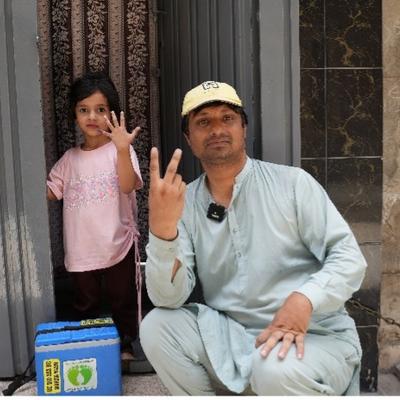
As the only polio-affected health worker in Faisalabad, Punjab province, Adnan knows the high price of refusing the vaccine and is determined that no child should face the challenges he did.
Photo: Adnan Shaukat with his daughter after polio vaccination. PC @NEOC/2024
Adnan Shaukat recalls the day he realized he was different from his siblings and other children in the area. After his left side of body became entirely paralyzed by polio, he soon understood that he had polio and would face challenges others would not. Yet, Adnan didn’t lose hope; he mustered the courage to live a life as normal as any other child.
"Since childhood, I aimed to live a normal life like other kids. I wanted to learn to ride a bicycle and a motorbike. Everyone around me, including my father, discouraged me, saying I wouldn’t be able to do it. But with courage and hope, I proved them wrong. I learned to ride both a bicycle and a motorbike, and to this day, I ride them even with one leg and arm paralyzed," said Adnan.
Adnan has brought this same hope and determination to the polio program since he joined in 2012. Currently, as the Area In charge, he walks 3 to 4 kilometers from the DHO office to his assigned area during each campaign. Despite offers to join fixed or transit teams due to his condition, Adnan insisted on joining the mobile teams so he could go door to door, using himself as an example to convince parents about the importance of polio vaccination.
“We witness Adnan’s utmost dedication and commitment to polio eradication in the area. His social mobilization skills are very strong; he regularly goes door to door to convince parents to vaccinate their children. He feels no shame in using himself as an example of the consequences of negligence. He is approachable till late at night during campaign weeks, showcasing his dedication to the cause,” said Mohsin Nazir, UCMO and Adnan’s supervisor.

Photo: Adnan Shaukat monitoring the performance of his teams during the polio campaign in Faisalabad. PC @NEOC/2024.
Adnan was born in 1986, a time when his paternal grandmother believed the polio vaccine was unnecessary. His mother, who was too young to make the right decision, still regrets not administering the drops.
“I still regret listening to Adnan’s grandmother and not giving him the polio drops. He was my firstborn, and I was too young to make the right decision for my son. Later, I ensured my other two children completed their routine immunizations. His grandmother also regretted Adnan’s situation and later convinced all parents in the family of the importance of vaccination,” said Adnan’s mother.
In the same year Adnan contracted polio, two other cases were reported in his street, all due to negligence and lack of awareness. Determined to live a normal life and not let his disability hinder him, Adnan insisted on being treated like any other student in school, asking teachers to grade him on merit rather than sympathy.
“Till today, children and adults call me disabled and make fun of me. I faced the same remarks in my education and work life. They usually apologize later, but this doesn’t affect me. I don’t want any child in my country to face the discrimination and challenges I faced. I go door to door to convince parents not to refuse vaccination, and fortunately, there are no refusals in my area,” said Adnan.
Adnan is entirely committed to his job, religiously performing his duties, and believing it is the responsibility of every Pakistani to contribute to a healthier future for the country's children. He is willing to work even without any benefits, driven solely by a sense of national duty.
Photo: Adnan Shaukat administrating polio drops to his own daughter during the polio campaign in Faisalabad. PC @NEOC/2024.

“I have two daughters under five, and I ensure they receive polio drops. I want to see them healthy, along with all other children in Pakistan. I wish to be part of the team that contributes to the eradication of polio from Pakistan,” said Adnan.
Written by Amina Sarwar, UNICEF Pakistan Country Office

